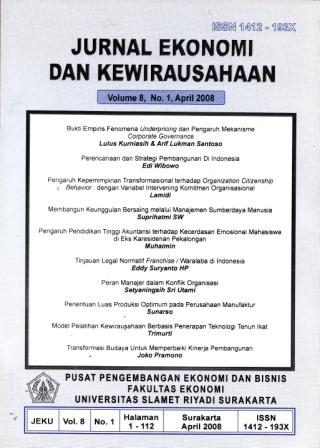PENGARUH PENDIDIKAN TINGGI AKUNTANSI TERHADAP KECERDASAN EMOSIONAL MAHASISWA DI EKS KARESIDENAN PEKALONGAN
Abstract
Abstract
This research aims to analyze the difference emotional quotient between junior student, last grade student, between student and not student whose job is an employee in the same age. And to analyze quality of accountancy college in their learning process with emotional quotient student.
The sample in this research are junior and last grade student accountancy major in Karesidenan Pekalongan include Universitas Pekalongan, STIE Muhammadiyah, and Universitas Panca Sakti Tegal. We’re analyzed using independent sample t test.
This research results that the grade of emotional quotient between junior student and last grade student in accountancy major is significantly different. But these differences are influenced by the length of factor to learn in accountancy college. All this parameter can be indicated because the emotional quotient grade between the last grade student is significantly different with another younger in the same age who have involved in both formal and informal education. In this research field, last grade student has better emotional quotient than employee because their experience in accountancy college is creating someone different emotional quotient grade. And the quality of accountancy college gives better emotional quotient their student too.
Keywords: emotional quotient, accountancy major, independent sample t test
Downloads
Published
Issue
Section
License
Authors who publish this journal agree to the following terms:
- Authors retain copyright and grant the journal right of first publication with the work simultaneously licensed under a Creative Commons Attribution License that allows others to share the work with an acknowledgement of the work's authorship and initial publication in this journal.
- Authors can separately make additional contractual arrangements for non-exclusive distribution published by the journal (e.g., publish it in a book), with an acknowledgement of its initial publication in this journal.
- Authors are allowed and encouraged to send their work via online (e.g., in the institutional repositories or their website) after published by the journal.









